The contents of organic sknicare products and natural skincare products are the same as the contents of regular skincare products.
The only difference is its name.
However, many people continue to mistaken that “organic and naturalproducts are safer than regular products.”
This is because they believe that organic and natural ingredients are safe, and therefore organic and natural products that contain those ingredients are safe too.
This would be completely fine if organic and natural products were safer than regular products, but the reality is the opposite.
Organic, natural, and regular skincare products are all the same in terms of safety.
There are 6 reasons why their safety is the same.
1. The contents of organic, natural, and regular skincare products are the same. 2. Organic and natural ingredients are not always gentle on the skin. 3. Organic and natural ingredients contain impurities. 4. Skincare products with 100% organic and natural ingredients do not exist. 5. Organic and natural ingredients do not increase the safety of sknicare products. 6. Organic and natural skincare products are not regulated.
One significant difference between organic, natural, and regular products (apart from their names) is their price. Organic and natural products tend to be more expensive.
For people who want to use something natural, we recommend organic and natural skincare products.
But for people with sensitive and/or irritated skin, we recommend regular skincare products because they are more affordable and effective.
Below, we dive deeper into the differences between organic/natural, and regular skincare products. We also explain why organic and natural products irritate your skin, and provide solutions!
What’s the difference between organic/natural products and regular products?
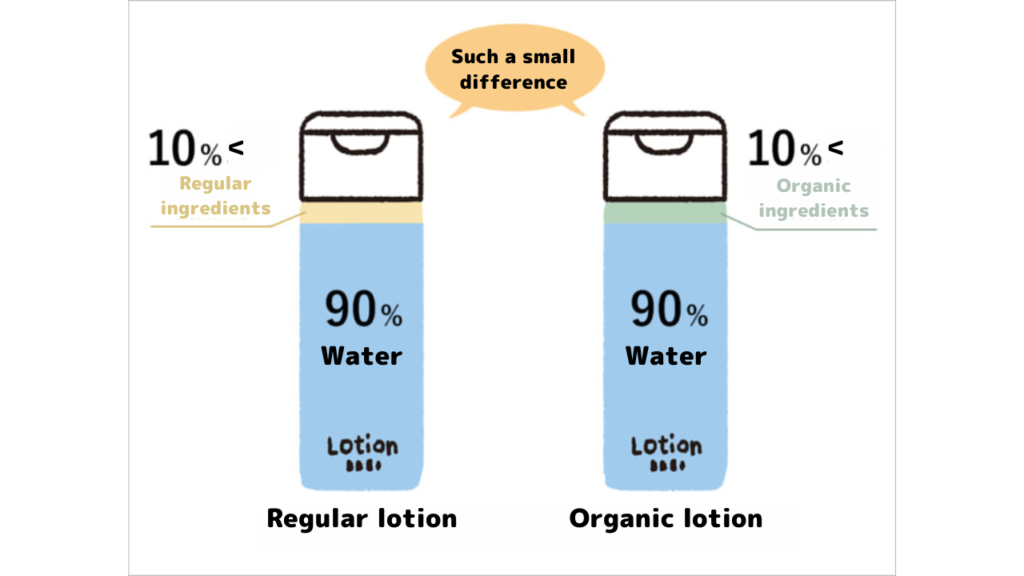
Each skincare product has pre-determined ingredients and ratios of ingredients.
Let’s take a look at the difference between organic toners and regular toners.
Common ingredients in all toners
| Ingredient | Functions | Raw materials | Amount added |
| Purified water | Hydrate stratum corneum, dissolve ingredients | Deionized water | 30~95% |
| Alcohol | Cooling, bacteriostatic, dissolve ingredients | Ethanol, impropanol | ~20% |
| Humectants | Moisturize stratum corneum, product feel, dissolve ingredients | Polyhydric alcohols (glycerin, propylene glycol, dipropylene glycol, 1.3-butylene glycol, polyethylene glycol), sugars (hyaluronic acid, maltitol), amino acids (pyrrolidonecarboxylic acid) | ~20% |
| Conditioners Emollients | Skin emollient, moisturizing, product feel | Ester oil, vegetable oil (olive oil, jojoba oil) | Appropriate amount |
| Solubilizers | Solubilizing raw material ingredients | Surfactants with high HLB (polyoxyethylene oleic ether) | ~1% |
| Buffers | pH adjustment | Citric acid, lactic acid, amino acids, sodium citrate | Appropriate amount |
| Thickeners | Product feel, moisturizing | Alginate, cellulose derivatives, quinces seed gum, pectin, pullulan, xanthan gum, bee gum, carboxyvinyl polymer, acrylic acid-based polymers, rabonite | ~2% |
| Fragrances | Scent | Geraniol, linalool | Appropriate amount |
| Preservatives | Microbial stability | Methylparaben, phenoxyethanol | Appropriate amount |
| Colorants | Color | Approved dyes | Appropriate amount |
| Anti-browning agents | Prevent fading and discoloration | Metal ion sequestering agents, UV absorbers | Appropriate amount |
| Medicinal agents | Skin tightening, skin sterilization, skin revitalization, anti-inflammation, inhibition of melanin production | Zinc sulfochalcate, sodium sulfochalcate, benzalkonium hydrochloride, photosensitizer, vitamin and amino acid derivatives, animal and plant extracts, glycyrrhizic acid derivatives, allantoin, arbutus, kojic acid, vitamin c derivatives | Appropriate amount |
For example, regular toners are about 90% water, and the remaining 10% are beauty ingredients, preservatives, stabilants, colorants, and fragrances.
Organic and natural toners are exactly the same.
More than 40~84% is water.
This means that more than half of organic and natural toners are the same as regular toners.
Ingredients contained in organic toners
The primary difference in the ingredients of organic and regular toners is the beauty ingredients.
There are 3 categories:
- If the beauty ingredients are organic → “organic toner”
- If the beauty ingredients are natural → “natural toner”
- If the beauty ingredients are synthetic → “regular toner”
For regular toners which are 90% water, beauty ingredients make up about 5%.
The remaining 5% must be thickeners and preservatives.
In addition, if the toner has color, colorants must be added.
If the toner smells good, fragrances must be added.
Toners with colorants and fragrances have less beauty ingredients.
This means that 95% of organic and natural toners are the exact same as regular toners.
In other words, organic and natural toners are <5% organic/natural ingredients + >95% water.
What’s the difference between organic products and natural products?
If there is no difference between organic/natural and regular skincare products, what’s the difference between organic and natural products?
First, let’s start with the definition of each.
What are “organic products?”
Organic products and natural products are not regulated.
If they were regulated, they would have to meet specific conditions in order to be called “organic/natural products.”
Regulations for organic ingredients varies from country to country, company to company.
There are also many certification organizations, and each of them have different approaches.
This means that there is no definition for organic and natural skincare products.
The current state of organic products is very uncertain due to the lack of uniform regulations.
Global standards for organic products
There are no global standards for organic products.
Some people may think,
“There is no standard for organic products in Japan, so it can’t be trusted.”
In reality, there is no standard in any part of the world.
However, certification organizations exist globally.
For example, Europe has 4 certification organizations.
- England’s Soil Association
- France’s Ecocert
- Italy’s ICEA
- Germany’s Demeter
Recently, Europe has been moving toward creating global standards for organic cosmetics.
This has resulted in the formation of cosmetics certification organizations such as NATRUE and COSMOS.
That being said, COSMOS allows the incorporation of some petroleum-derived synthetic ingredients.
Therefore, there are no clear standards for organic products worldwide, and its difference with regular products is ambiguous.
What are “natural products?”
In this article, we define natural products as products containing natural ingredients.
But the truth is, similar to organic products, there is no definition for natural products.
This means that products that do not contain natural ingredients can also be called natural products.
There is no penalty for advertising cosmetics that do not contain natural ingredients as “natural products,” nor is it a violation of pharmaceutical laws.
Any product can be called “organic” and “natural”
There is no definition for organic and natural products.
This means that any product can be advertised as “organic” or “natural.”
There is no meaning behind those two terms, but they are used to increase sales by feeding off the idea that organic/natural = safe and gentle.
Why organic products irritate your skin
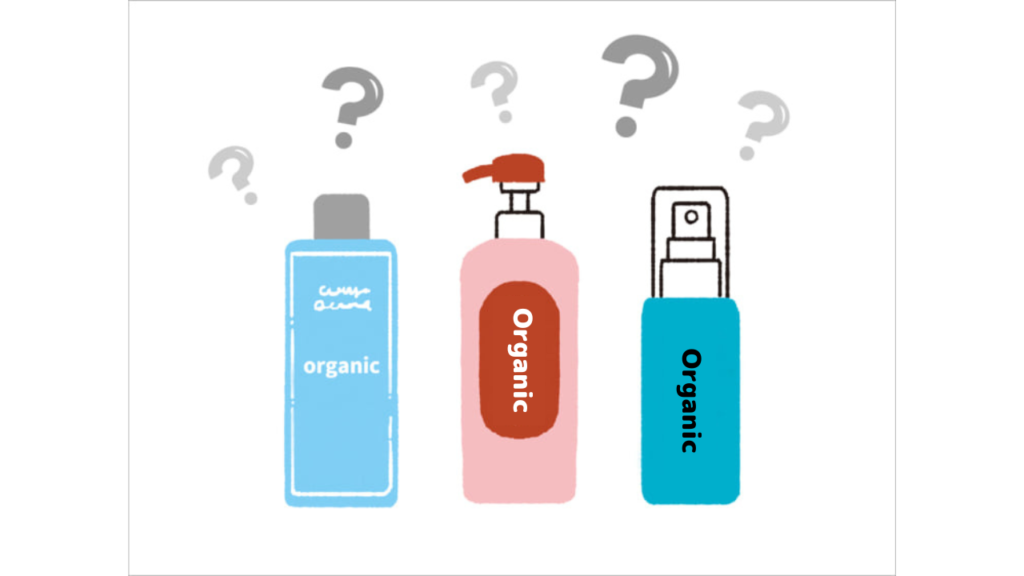
Below is some basic knowledge you should know before using organic and natural skincare products.
You may realize that you have believed wrong information about organic and natural products.
Natural ingredients are not always safe

When most people think of organic and natural ingredients, they think of ingredients extracted from animals and plants.
For some reason, there is an image that ingredients extracted from nature are safe.
In reality, the natural world is full of animals and plants that are harmful to humans.
Below are some animals that are poisonous to humans:
- Blowfish
- Scorpionfish
- Snakes
- Stingrays
Below are some plants that are poisonous to humans:
- Poison ivy
- Varnish tree
- Wax tree
- Nutgall
- Gingko
- Dendropanax trifidus
- Stinging nettle
- Swallow wort
If humans touch these poisonous plants, our skin becomes irritated.
Not to mention, cedar and cypress pollen cause allergies to our skin.
Clearly, the natural world is not entirely safe.
Rather, there are many natural ingredients that cause allergies.
Organic ingredients are not always safe
Organic ingredients are characterized by the fact that they are extracted from organically grown plants.
This means that the basis of safety is whether the plants are organically grown.
Does this mean that ingredients extracted from non-organic plants are dangerous?
If this is true, it means that everything except for the organic foods we eat (such as vegetables) are dangerous.
If organic and regular ingredients are dangerous, does this mean that regular skincare products contain pesticides?
In the past, no pesticides have been detected in skincare products.
Regardless of whether they are organic, natural, or regular ingredients, they do not contain pesticides.
This means that their safety is all the same.
In other words, the safety of organic and natural ingredients is the sae as regular ingredients.
Organic and natural ingredients do not increase the safety of sknicare products
Hypothetically, let’s assume that organic and natural ingredients are safer than regular ingredients.
Suppose that the beauty ingredients in organic and natural products are 100% organic and natural.
In this case, the organic or natural product is made up of 5% organic/natural ingredients and 95% regular ingredients.
If regular products cause irritation, can 95% of the irritation be suppressed by just 5% organic and natural ingredients?
This is impossible.
Fundamentally, organic and natural ingredients do not reduce irritation to the skin.
In fact, no ingredient can reduce irritation to the skin.
Therefore, just because a product contains organic and natural ingrediens, does not mean that your skin will not be irritated.
Organic and natural ingredients themselves are gentle to the skin, but have nothing to do with the safety of the product as a whole.
This means that incorporating organic and natural ingredients does not increase the product’s safety.
Organic and natural ingredients contain impurities

Impurities in raw ingredients can cause irritation, skin allergies, and other negative effects.
In addition, high levels of impurities can lead to product quality deterioration, such as color and odor changes when exposed to high temperature or sunlight for long periods of time.
Therefore, it is safer to use products that do not contain impurities.
However, natural ingredients contain many substances.
When organic and natural ingredients are extracted, they inevitably contain impurities that cannot be removed.
For example, jojoba oil is a plant-based oil that is extracted from jojoba seeds.
It is an ingredient extracted from natural materials, but jojoba oil contains about 5% impurities when extracted.
Of course, companies that handle jojoba oil test it for safety.
They need to test it for safety to confirm that it does not irritate the skin, and to make sure that they can use it as a skincare ingredient.
This means that organic and natural ingredients are dangerous to use unless tested for safety because they contain impurities.
Skincare products with 100% organic and natural ingredients do not exist

There are no skincare products that are created with 100% organic and natural ingredients.
This is because you cannot call it a skincare product if it is created with 100% organic and natural ingredients.
Skincare products must contain synthetic ingredients.
For example, skincare products must contain preservatives.
According to pharmaceutical laws, cosmetics whose quality has been stable for at least 3 years from its manufactured date do not need to list an expiration date.
This means that skincare producs are obligated to be stable for at least 3 years without being opened.
Therefore, preservatives are an essential ingredient.
In fact, organic and natural ingredients contain preservatives.
For thick products such as creams and lotions, synthetic ingredients are essential to maintain their texture and consistency.
For example, solubilizers, thickeners, pH regulators, and antioxidants.
Therefore, there are no products with 100% organic and natural ingredients.
Organic and natural ingredients are not always gentle on the skin

When most people think of organic and natural ingredients, they think of ingredients extracted from animals and plants.
For some reason, there is an image that ingredients extracted from nature are safe.
In reality, the safety of organic and natural ingredietns is the same as that of regular ingredients.
What should you do if your skin is sensitive and easily reactions to chemicals?
“My skin is irritated after using organic products…”
“I have sensitive skin so I’ve been using organic products. What should I do now?”
For those of you thinking this, we have compiled a list of solutions that people with sensitive skin should be concerned about.
If you have experienced skin irritated from skincare products, or if you have sensitive skin, please use these as a reference point.
Use products that do not contain organic and natural ingredients
If you have sensitive skin, avoid organic and natural ingredients.
Use products that do not contain organic and natural ingredients.
You may think that “organic = gentle to the skin” but as mentioned earlier, this is not the case.
Organic and natural ingredients contain impurities when they are extracted, and these impurities can irritate the skin.
Of course, not all organic and natural products are irritating.
But there is no point in gambling and putting your skin at risk.
There is no point in using products containing organic and natural ingredients that are likely to have impurities that irritation sensitive skin.
Organic and natural products are expensive as well, so it is a waste.
Use products that do not contain ingredients unnecessary for sensitive skin
Let’s take moisturizing creams, for example.
The following ingredients contained in creams are unnecessary for sensitive skin.
| Fragrances | |
| Colorants | Talc, mica, sericite, kaolin Silica, barium sulfate, calcium caronate, iron oxide, anthracite, titanium dioxide, zinc oxide, pearlescent agent, bismuth oxychloride, titanium mica, titanium dioxide-coated mica Yellow#5, Red#213, Red #223, Red #228, Red #226, Blue #404 β-carotene, gardenia blue, safflower red, chlorophyll, curcumin etc. |
| Alcohol |
For sensitive skin, we recommend products that contain minimal ingredients.
If there are too many ingredients, it is difficult to determine which ingredients are causing irritation on your skin.
Instead, it is important that the product contains ingredients that are truly necessary.
For example, moisturizing creams are used to supply oil to the skin, so it needs oil and oil-based ingredients. Preservatives are also needed to prevent spoilage.
A little bit of water is needed to improve the texture too.
The rest of the ingredients are unnecessary, especially fragrances, colorants, and alcohol.
Fragrances are effective to use for products whose raw materials have a strong odor.
For example, shampoos.
However, fragrances are unnecessary for moisturizing creams. They can also irritate sensitive skin.
In addition, alcohol is used to lighten the texture of products.
But for sensitive skin, alcohl can be irritating.
The texture of a product has nothing to do with how gentle and safe it is on the skin.
Therefore, avoiding products that contain these unnecessary ingredients is important for sensitive skin.
Refer to skin tests
There are 4 safety tests conducted for cosmetics and skincare products.
All of them are evaluated by a third-party organization based on objective indicators.
Safety tests for cosmetics and skincare products ・24-hour closed patch test ・Allergy test ・Stinging test ・Non-comedogenic test
Although these safety tests do not guarantee that everyone will be free from irritation, they are one indicator for determining the safety of a skincare product.
The most important part to pay attention to is, how many people were tested and what kind of results were obtained.
Be sure to use products that fully disclose their safety test results.
By the way, the most difficult safety test to pass is the stinging test.
Therefore, if you are concerned about the safety of a product, we recommend using products that have undergone a stinging test.
What is the “stinging test?”
“Stinging test” is a test to evaluate sensory stimuli such as stinging, itchiness, and heat sensation on sensitive skin.
Stinging irritation refers to sensory irritation such as burning sensations and itching when the product is applied to the skin.
Evaluation method
The following are prepared for the evaluation.
【1】Distilled water
【2】Target skincare product
The results of their application are compared.
- An appropriate amount of the product to be tested is placed on a cotton pad and applied near the cheekbones on both sides, and left in place for 60 seconds.
- The tester scores the irritation felt between 31 seconds and 60 seconds.
- After 60 seconds, the cotton pad is removed and the evaluation site is wiped with a cotton pad that is moistened with plenty of distilled water. After pressing the moisture with a paper towel, the tester remains at rest for 120 seconds.
- Repeat the above procedure.
What is the “non-comedogenic test?”
“Non-comedogenic test” is a test to confirm that the product does not cause acne.
Specifically, a sample of the product is applied to the back and tested histologically to determine whether comedones form.
If the product passes, it can be labeled as “non-comedogenic tested” on the package.
Use products that do not irritate the skin
If you have sensitive skin that becomes irritated by skincare products, you should choose low-stimulus products.
Moisturizers, cleansers, sunscreen, any product.
There are several products that can be very irritating, and you may be putting your skin under immense strain without realizing it.
Below, we have compiled a list of key points you should know when choosing the right product for your sensitive skin.
Choose cleansers that do not require double cleansing to reduce friction
If you have sensitive skin, we recommend using cleansers that do not require double cleansing.
Typically, cleansers remove oil-based dirt such as makeup and sebum.
However, if you cleanse and wash your face separately, it increases the number of times you touch your skin, which can cause friction and irritation.
Double cleansing products remove both oil and water-based dirt with a single application, so you only need to wash your face once.
They reduce friction on the skin and protects the skin’s barrier function.
Choose sunscreens that are SPF 20~30 and have 100% UV scattering agents
The UV-blocking effect of sunscreen is expressed by its SPF.
We recommend choosing a sunscreen with an SPF of 20~30.
The higher the SPF value, the greater irritation on sensitive skin.
In fact, the UV-blocking effects are very minimal for SPF values higher than 30.

When considering its UV-blocking effects and burden on the skin, SPF 20~30 is the perfect value.
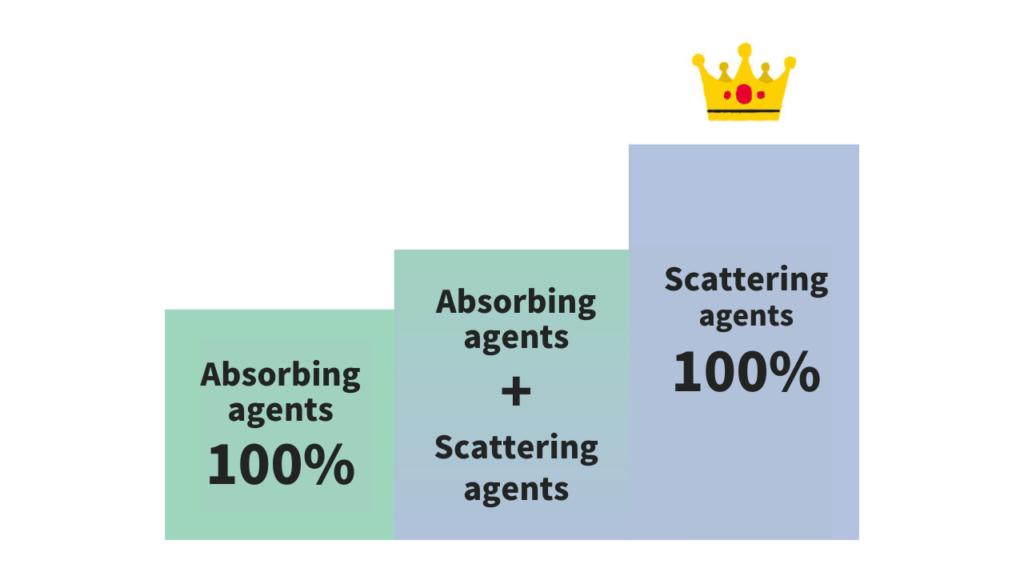
In addition, it is important to choose sunscreens that have 100% UV scattering agents.
In order to increase the SPF value, ingredients called UV absorbers are added.
But when UV absorbers block UV rays, they cause a chemical reaction on your skin and cause heat conversion.
This heat conversion irritates the skin.

Skincare products we recommend for sensitive skin
1. Highly moisturizing all-in-one gel
The first product we recommend is an all-in-one gel that specializes in moisturization.
It has passed the following safety tests that we mentioned earlier and it was deemed “safe to use” by a third-party organization, proving that it is gentle and safe for the skin.
Skincare safety tests it has passed ・24-hour closed patch test ・Allergy test ・Stinging test ・Non-comedogenic test
It has also completed efficacy tests for its moisturizing properties.
The following benefits were observed through testing.
- Prevention of skin irritation
- Increased skin moisture content
- Improvement of fine wrinkles caused by dryness
Highly moisturizing all-in-one gel: Aquatect Gel
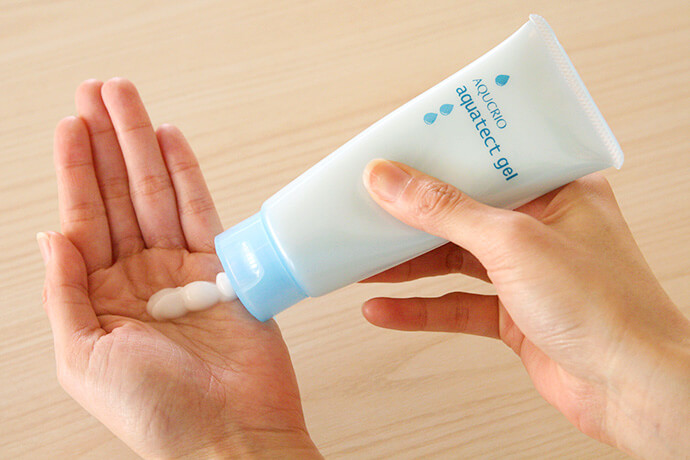
“I want to use a safe skincare product…”
“I’m not satisfied with the moisturizing products I’m using right now…”
If this is you, we recommend Earthcare Asia’s Aquatect Gel.
Earthcare Asia’s Aquatect Gel is an all-in-one gel that moisturizes and improves the skin of people suffering with dry skin.
It has passed four safety tests and efficacy evaluation tests, making it a product that has perfected ‘safety’ and ‘effectiveness.’
With just one bottle of Aquatect Gel, you can provide the necessary moisture your skin needs. No toners, lotions, creams, or any other products necessary.
Not only can you save time and effort, but you will also be able to give your skin the firmness and moisture it has been lacking.
It also reduces friction to your skin to 1/3 of normal skincare routines.
In fact, it has been proven that after using Aquatect Gel for 4 weeks, the skin’s moisture level was increased.
Aquatect Gel thoroughly focuses and specializes in moisturization.
By using it, your skin will achieve the perfect moisture balance to solve your skin troubles.


2. Low-stimulus cleansing gel
The second product we recommend is a double cleansing gel.
It has 2 functions.
- It is a cleanser that removes oil-based dirt such as makeup and sebum clogged in pores.
- It is a face wash that removes dead keratin plugs and excess sebum.
This double cleansing gel reduces the number of products you have to use, which reduces friction and irritation caused on the skin.
When friction to the skin is reduces, your skincare can be completed without causing unnecessary damage to your skin’s barrier function.
Low-stimulus cleansing gel: Double Cleansing Gel
We recommend Earthcare Asia’s Double Cleansing Gel.
Earthcare Asia’s Double Cleansing Gel has passed four safety tests and efficacy evaluation tests, making it a product that has perfected ‘safety’ and ‘effectiveness.’
It does not contain any fragrances, colorants, and alcohol, making it gentle on even the most sensitive skin.
Double Cleansing Gel reduces irritation while thoroughly cleansing and washing your skin.
By using it, your skin’s barrier will remain strong and will solve your skin troubles.

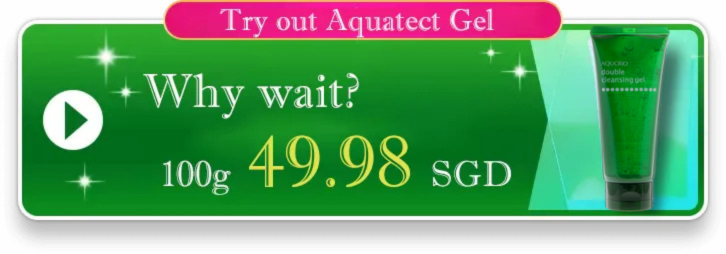
Summary
If you are looking for organic and natural skincare products, you must be looking for products that are gentle to the skin.
Unfortunately, regular products are equally as gentle and safe as organic and natural products.
This is because the contents of organic, natural, and regular products are 99% identical.
Just because the ingredients are organic and natural, does not mean that they are gentle and safe on the skin.
When organic and natural ingredients are extracted, they contain impurities that irritate the skin.
If we consider this, it can be said that regular skincare products are more gentle.
Incorporating organic and natural ingredients does not increase the safety of the product.
In fact, neither organic, natural, or regular ingredients contain pesticides.
Therefore, organic, natural, and regular products are all the same in terms of their safety and effectiveness.
The only difference is that organic and natural products are more expensive.
If you believe that you will achieve satisfaction from using expensive products, then we recommend organic and natural products.
But if you are looking for products that are gentle and effective, we recommend regular products.
This is because regular products do not contain impurities and are very cost efficient.
If you are looking for products that are gentle and effective, do not be fooled by the names and prices of organic/natural products. There are far more important factors to consider.





コメント